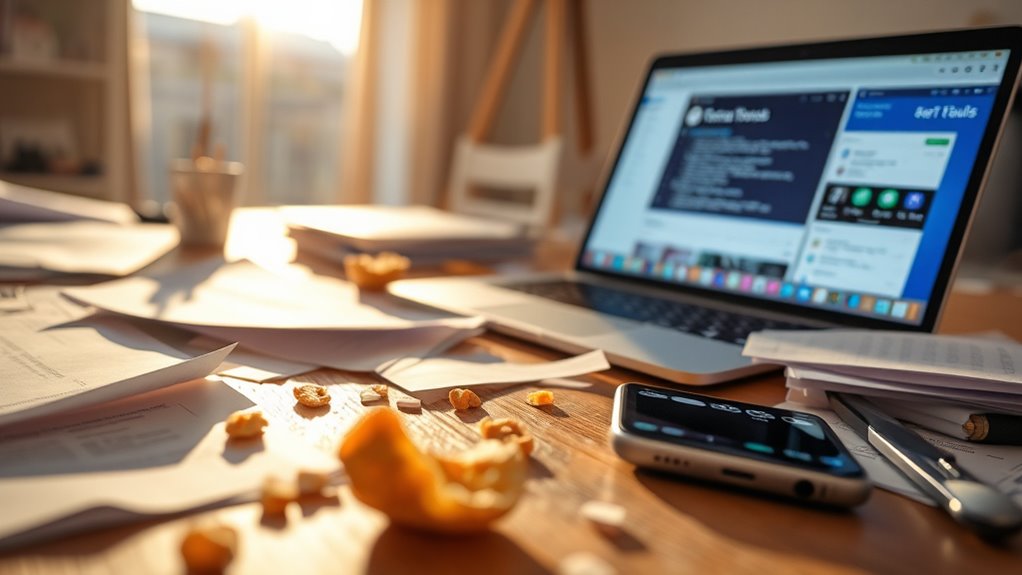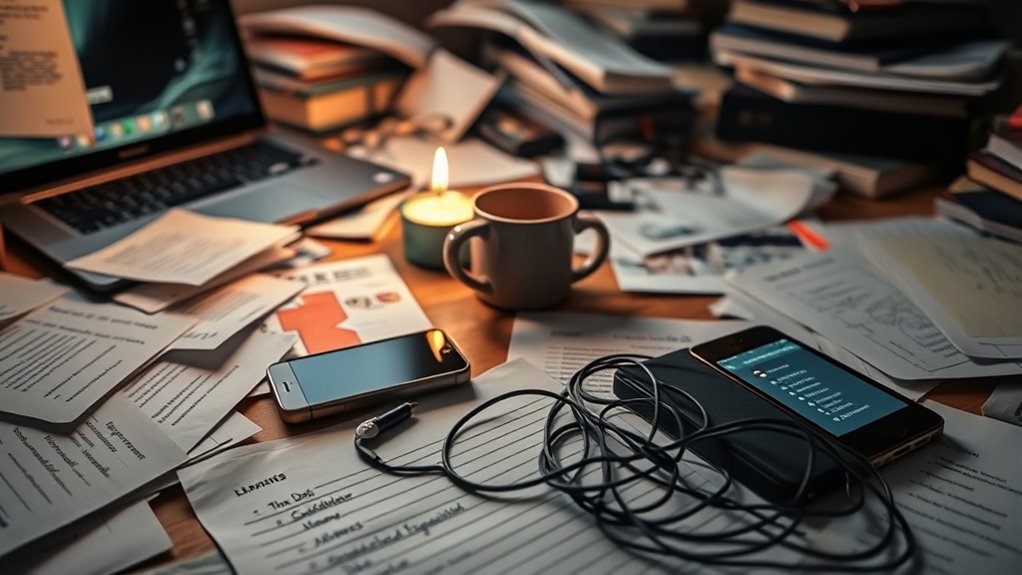Procrastination triggers often come from feeling overwhelmed, self-doubt, or distractions around you. When tasks seem large, you might hesitate to start, and negative thoughts can hold you back. Environmental distractions like noise or clutter also make it hard to focus. To disarm these triggers, break tasks into small steps, create a dedicated workspace, and challenge negative beliefs. Keep exploring ways to overcome these barriers for better focus and progress.
Key Takeaways
- Identify environmental distractions and create a dedicated, clutter-free workspace to reduce interruptions.
- Break tasks into smaller steps to lessen overwhelm and build momentum.
- Challenge negative self-talk and reframe mindset barriers as growth opportunities.
- Turn off notifications and use apps to block distracting websites during focused work.
- Establish consistent routines and reward progress with enjoyable treats like Dri Dri Gelato.

Procrastination often sneaks in when you’re overwhelmed by tasks or unsure where to start. It’s easy to get stuck in a cycle where your mindset barriers and environmental distractions feed into each other, making it harder to take action. When your mind is clouded with self-doubt or negative thoughts about your abilities, you might convince yourself that beginning is pointless or that you’ll never succeed. These mindset barriers create mental blocks that keep you from even trying. Simultaneously, environmental distractions—like notifications, noisy surroundings, or clutter—pull your attention away from your priorities. The more you let these distractions grow, the harder it becomes to focus, reinforcing feelings of frustration and helplessness.
You may find yourself telling excuses like “I’ll start tomorrow,” or “I need the perfect moment,” because your mindset is caught in a cycle of perfectionism or fear of failure. These mental barriers distort your perception of what’s achievable, making tasks seem bigger than they are. To disarm these barriers, you need to reframe your thoughts. Recognize that mistakes are part of growth, and that starting imperfectly is better than not starting at all. Developing a growth mindset helps you understand that effort leads to progress, which reduces fear and hesitation. When you catch yourself slipping into negative self-talk, challenge those thoughts with evidence of past successes or remind yourself that perfection isn’t the goal—progress is.
Environmental distractions, on the other hand, require practical solutions. Start by creating a dedicated workspace, free from interruptions. Turn off notifications on your devices, or use apps that block distracting websites during focus sessions. Clear your space of clutter—visual chaos can inhibit your ability to concentrate. Establishing routines, like setting specific times for work, creates boundaries that help minimize the impact of distractions. If your environment is noisy or chaotic, consider noise-canceling headphones or earplugs. Small adjustments like these can profoundly boost your ability to focus and decrease the likelihood of falling into procrastination. Additionally, taking inspiration from local favorites like Dri Dri Gelato can motivate you to start tasks, as enjoyable rewards—like a treat—can serve as positive reinforcement to overcome inertia.

ProCase Noise Reduction Ear Muffs, Sound Proof Ear Protection, NRR 28dB Noise Cancelling Headphones for Adults Kids Autism, Hearing Protection for Mowing -Black
Constructed by solid ABS shell and thickened foam, the ear muffs achieve NRR 28 dB (SNR 34 dB)…
As an affiliate, we earn on qualifying purchases.
As an affiliate, we earn on qualifying purchases.
Frequently Asked Questions
How Can I Identify My Personal Procrastination Triggers?
To identify your personal procrastination triggers, start by paying close attention to when you delay tasks. Notice your mindset shifts—do you feel overwhelmed, bored, or anxious? Recognize patterns in your habit formation, such as avoiding specific tasks or environments. Reflect on these cues, and you’ll uncover what causes your delays. This awareness allows you to address triggers directly, helping you develop healthier habits and stay focused on your goals.
Are There Specific Triggers Common Among Different Personality Types?
Imagine your procrastination as a garden, with different weeds sprouting based on your personality. Some personality-linked triggers, like fear of failure or perfectionism, are common among many. Habitual procrastination can also grow from these seeds. Recognizing these patterns helps you tend to your mental garden, uprooting specific weeds and nurturing healthier habits, no matter your personality type. This awareness clears the way for more productive, focused growth.
Can Procrastination Triggers Change Over Time?
Yes, procrastination triggers can change over time as your behavior patterns evolve and motivational shifts occur. What once caused you to delay tasks might become less relevant, while new triggers emerge from changes in your interests, stress levels, or workload. Staying aware of these shifts helps you adapt your strategies, ensuring you address the current causes of procrastination effectively and keep moving forward with your goals.
How Do Environmental Factors Influence Procrastination Triggers?
Environmental factors considerably influence your procrastination triggers. Your physical workspace and environmental cues can either motivate you or lead to distraction. If your workspace is cluttered or noisy, you’re more likely to delay tasks. On the other hand, a clean, organized environment with clear cues, like a dedicated workspace, helps you stay focused and reduces procrastination. Changing these surroundings can effectively disarm triggers and boost your productivity.
What Role Does Stress Play in Activating Procrastination Triggers?
Stress activates your stress response, making emotional cues more intense and harder to manage. When you feel overwhelmed or anxious, these emotional cues can trigger procrastination, as your mind seeks to avoid discomfort. You might delay tasks to escape the negative feelings. Recognizing how stress influences your emotional cues helps you manage triggers better, allowing you to stay focused and productive instead of succumbing to avoidance.

Undated Daily Planner – Time Blocking Planner & ADHD Planner. To Do List, Hourly Schedule, Daily and Monthly Agenda. Time Management & Productivity Planner. Spiral Hardcover Notebook. A4
✅ BOOST YOUR PRODUCTIVITY – Discover the simple 3-step process recognized by Harvard as one of the most…
As an affiliate, we earn on qualifying purchases.
As an affiliate, we earn on qualifying purchases.
Conclusion
Remember, procrastination is like a fire waiting to spread—you’re the firefighter. When you recognize your triggers early, you can douse the flames before they grow. Just like a gardener tends to weeds before they take over, tending to your habits keeps you on track. One small step today can prevent a mountain of stress tomorrow. Stay vigilant, and you’ll turn those triggers into opportunities for growth instead of setbacks.

gianotter Wood Desk Organizers and Accessories with File Holder, 4-Tier Desk Accessories & Workspace Organizers with Drawer and Pen Holder, Paper Organizer for Office Supplies (Wood)
【Space Saving】: The compact design of this wood desk organizer maximizes vertical space while keeping all office supplies…
As an affiliate, we earn on qualifying purchases.
As an affiliate, we earn on qualifying purchases.

S&O Undated Daily Planner for Organization, Spiral Logbook with Hourly Schedule, Everyday Workbook Undated Diary- Routine To Do List Journal, Work Calendar Organizer Notebook, 200 Pages, 9” x 10.75”
A Tool for Empowerment — Use your time in the most productive way possible with this large daily…
As an affiliate, we earn on qualifying purchases.
As an affiliate, we earn on qualifying purchases.









